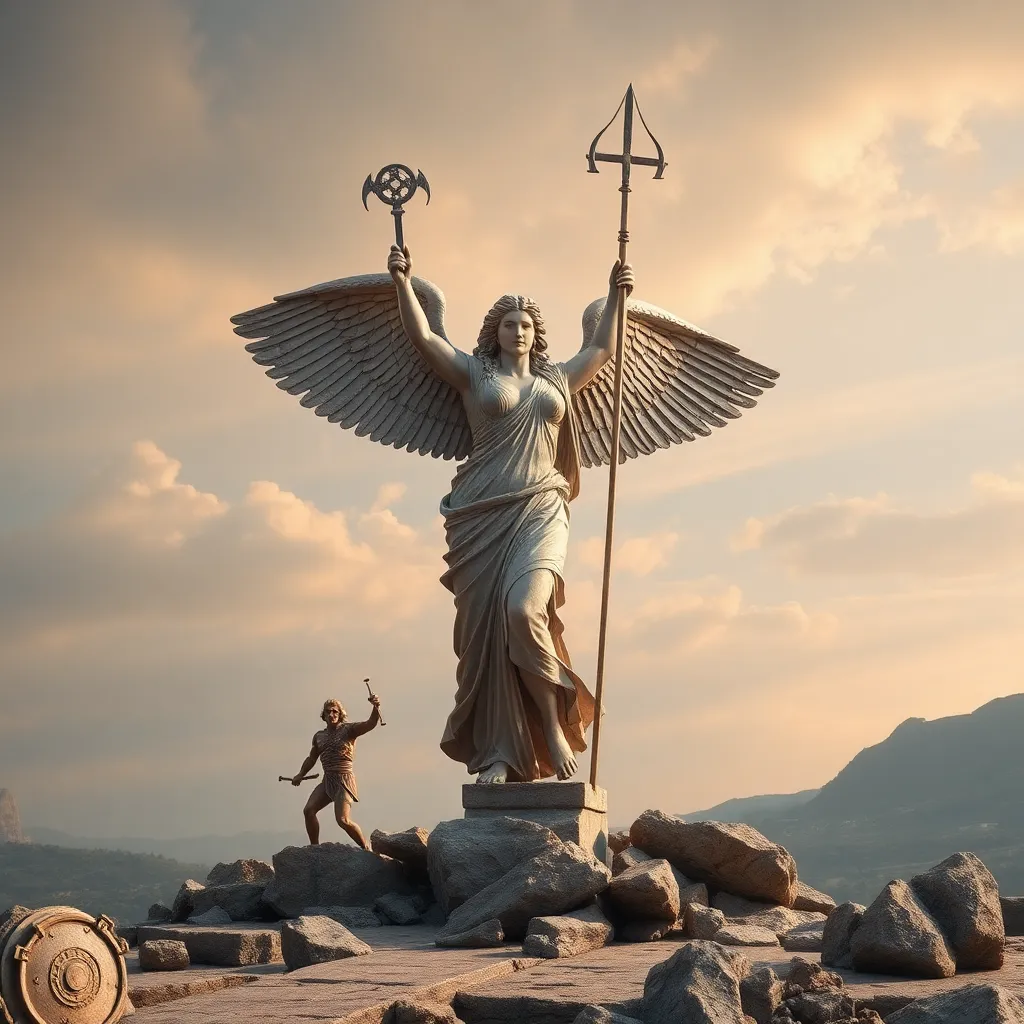Athena and the Intersection of War and Peace in Mythology
I. Introduction
Athena, one of the most revered deities in Greek mythology, holds a significant place in the pantheon of ancient gods. As the goddess of wisdom, warfare, and strategy, she embodies a complex duality that intertwines the themes of war and peace. This article aims to delve into how Athena represents the intersection of these two contrasting yet complementary themes, showcasing her multifaceted character and the lessons derived from her myths.
II. Athena: The Goddess of Wisdom and Warfare
A. Origins and Birth of Athena
Athena’s origins are as unique as her character. According to mythology, she was born fully grown and armored from the forehead of her father, Zeus, after he swallowed her pregnant mother, Metis, the goddess of wisdom. This extraordinary birth symbolizes her intrinsic connection to both wisdom and strategy.
B. Attributes and Symbols Associated with Athena
Athena is often depicted with various attributes that highlight her dual nature:
- Owl: Symbolizing wisdom and knowledge.
- Helmet and Armor: Representing her warrior aspect.
- Spears and Shields: Tools of strategy in battle.
- Olive Tree: A symbol of peace and prosperity, emphasizing her role as a peacekeeper.
C. Her Dual Role as a Goddess of Wisdom and a Warrior
Athena’s duality is evident as she serves not only as a protector of cities and a guide to heroes but also as a fierce warrior in the realm of battle. This dual role allows her to navigate the complexities of conflict and resolution.
III. The Role of Athena in Warfare
A. Athena as a Strategist in Battles
1. Key Myths Illustrating Her Strategic Prowess
In many myths, Athena is portrayed as a brilliant strategist. For example, in the story of the Trojan War, she provides crucial advice to Greek heroes, helping them devise clever tactics to outsmart their enemies.
2. Importance of Intelligence in Warfare
Athena emphasizes the importance of intelligence and cunning over brute force in warfare, showcasing that wisdom is as vital as strength in achieving victory.
B. Athena’s Involvement in the Trojan War
1. Her Support for the Greeks
Athena plays a significant role in supporting the Greek forces during the Trojan War, advocating for their cause and providing guidance to key figures like Odysseus and Achilles.
2. Key Events Influenced by Athena’s Intervention
Her interventions in the war lead to pivotal moments, such as:
- The construction of the Trojan Horse.
- Encouragement of Greek warriors to engage in strategic warfare.
- Protection of heroes in battle.
IV. Athena as a Peacekeeper
A. Athena’s Role in Promoting Peace and Diplomacy
1. Myths Highlighting Her Advocacy for Resolution and Harmony
Despite her martial prowess, Athena is also recognized for her role as a peacemaker. Myths often depict her mediating disputes and fostering resolution among conflicting parties.
2. Athena’s Influence on Cultural and Political Peace in Athens
Athena was regarded as the patroness of Athens, where she encouraged the establishment of democratic principles and cultural advancements, emphasizing the importance of dialogue and cooperation over conflict.
B. The Significance of Her Peacekeeping Attributes in Contrast to Her Warlike Nature
This duality illustrates a profound message: that true strength lies not only in the ability to wage war but also in the capacity to foster peace and understanding.
V. The Symbolism of Athena in Art and Literature
A. Depictions of Athena in Ancient Greek Art
Athena is a popular subject in ancient Greek art, often depicted in sculptures, pottery, and frescoes, showcasing her armored figure, the owl, and the olive tree, symbolizing her multifaceted nature.
B. Literary Portrayals of Athena’s Dual Nature in Epic Poetry
In epic poems such as the “Iliad” and the “Odyssey,” Athena’s character is explored in-depth, illustrating her strategic intelligence, wisdom, and her role as a protector of heroes.
C. The Lasting Impact of These Representations on Contemporary Views
Today, these artistic and literary representations continue to influence how Athena is perceived, embodying the balance of intellect and strength.
VI. The Intersection of War and Peace in Athena’s Myths
A. Analysis of Specific Myths that Showcase the Balance of War and Peace
Several myths illustrate Athena’s ability to navigate both realms effectively. For example, her support during the Trojan War juxtaposes her later role in promoting peace in Athens.
B. The Consequences of Athena’s Decisions in Both Domains
Her choices often lead to significant outcomes, such as the victory of the Greeks and the subsequent establishment of a prosperous Athenian state, highlighting the consequences of her dual role.
C. How These Myths Reflect Ancient Greek Values Regarding Conflict and Resolution
The myths surrounding Athena reveal ancient Greek values that prioritize wisdom, strategy, and the importance of peace after conflict, illustrating a nuanced understanding of human experience.
VII. Modern Interpretations of Athena’s Duality
A. How Contemporary Society Views Athena’s Character
In modern times, Athena is often viewed as a symbol of empowerment, representing the balance between strength and intellect in leadership roles.
B. Athena’s Influence on Modern Concepts of Feminism and Leadership
Athena’s character has inspired contemporary discussions on feminism, leadership, and the role of women in positions of power, demonstrating that femininity can coexist with strength and wisdom.
C. The Relevance of Her Duality in Current Discussions of War and Peace
The themes of Athena’s duality are increasingly relevant in today’s context, where the complexities of conflict resolution and diplomacy are more critical than ever.
VIII. Conclusion
Athena’s complex role in Greek mythology serves as a profound reflection on the intersection of war and peace. Her character teaches us the importance of wisdom in both conflict and resolution, emphasizing that true strength lies in the balance of these dualities. As we continue to engage with her legacy, we can draw valuable lessons that resonate in our contemporary society, illuminating the ongoing discourse on the nature of power and the pursuit of harmony.




